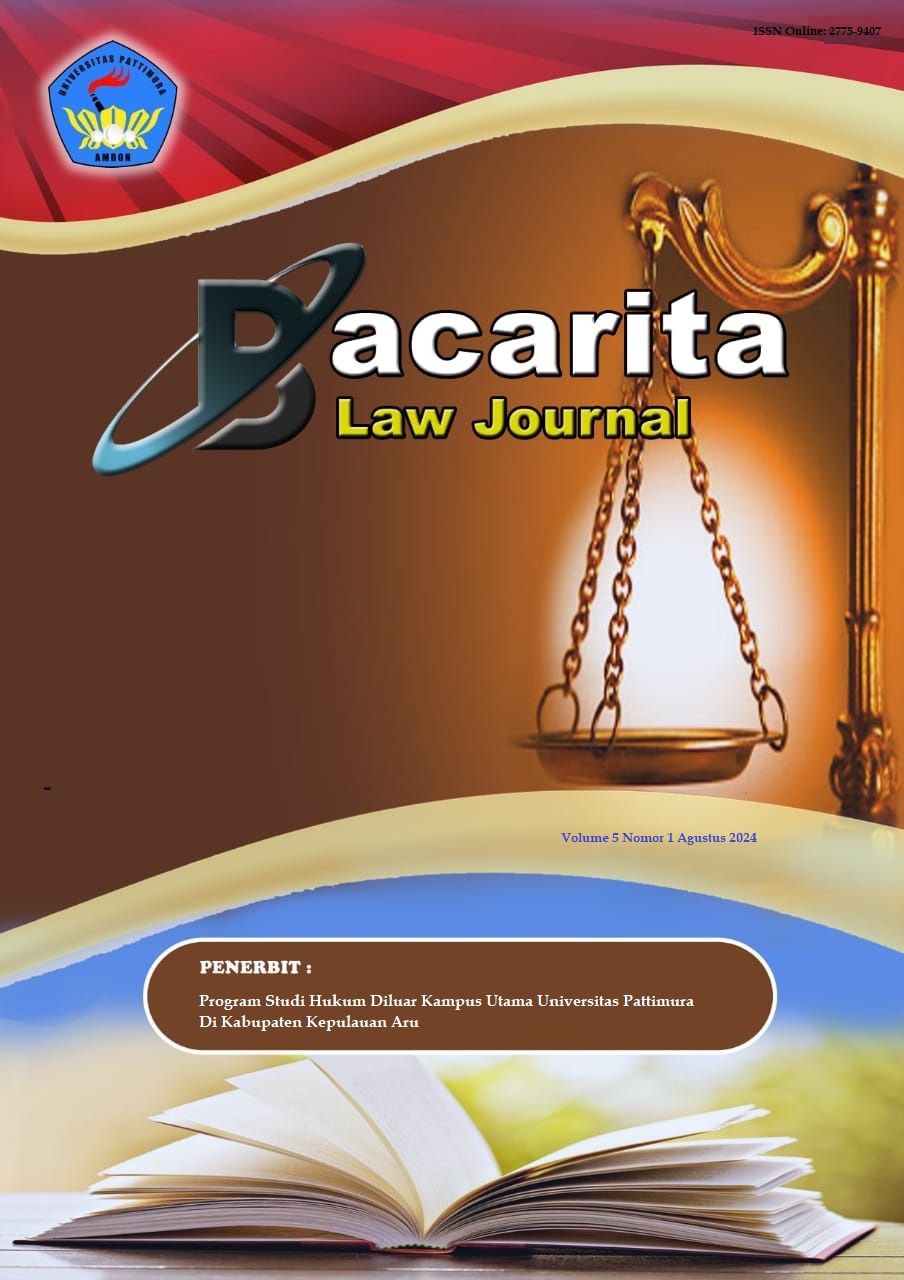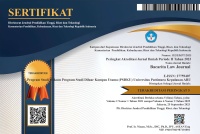Putusan Mahkamah Konstitusi Nomor: 85/PUU-XX/2022 Tentang Badan Peradilan Khusus Sebagai Landmark Decisions
Abstract
The Constitutional Court is a judicial institution responsible for maintaining law and justice through its decisions known as landmark decisions. One of the decisions that is currently controversial in society is Decision Number 85/PUU-XX/2022 concerning the establishment of a special judicial body that should have been formed before the regional head elections which will be held simultaneously in 2024. However, until now there has been no legal certainty regarding the establishment of a special judicial body and the Constitutional Court remains authorized to handle regional head election disputes. The purpose of this study is a form of examination to determine whether the Constitutional Court Decision Number 85/PUU-XX/2022 meets the criteria as a landmark decision or not as interpreted by the Constitutional Court. By using a qualitative approach, this study uses a normative legal analysis based on descriptive legal theory. The data sources used in this study are journals, books and the results of previous studies that have been published. The results of the discussion in this study indicate that the Constitutional Court Decision Number 85/PUU-XX/2022 successfully meets the four criteria for a landmark decision. However, there is one criterion that was not met, namely a decision that annulled the entire law because the panel of judges only annulled Article 157 paragraph (1), (2) and the phrase in Article 157 paragraph (3) so that this decision cannot be fully categorized as a landmark decision.
Downloads
References
Asy’ari, Syukri, Meyrinda Rahmawaty Hilipito, and Mohammad Mahrus Ali. “Model Dan Implementasi Putusan Mahkamah Konstitusi Dalam Pengujian Undang-Undang (Studi Putusan Tahun 2003-2012).” Jurnal Konstitusi 10, no. 4 (2016): 694–97. https://doi.org/10.31078/jk1046.
Baharuddin Riqiey. “Kewenangan Mahkamah Konstitusi Dalam Memutus Perselisihan Hasil Sengketa Pilkada Pasca Putusan Mahkamah Konstitusi Nomor 85/PUU-XX/2022.” Japhtn-Han 2, no. 1 (2023): 115. https://doi.org/10.55292/japhtnhan.v2i1.59.
Chandranegara, Ibnu Sina. Hukum Acara Mahkamah Konstitusi. Jakarta: Sinar Grafika, 2021.
Darwis, Muh. Salman. “Implementasi Kewenangan DKPP Pasca Putusan Mahkamah Konstitusi Nomor 115/PHPU.D-XI/2013.” Jurnal Konstitusi 12, no. 1 (2016): 80–81. https://doi.org/10.31078/jk1215.
Indra, Mexsasai, Geofani Milthree Saragih, and Mohamad Hidayat Muhtar. “Strength of Constitutional Court Decisions in Judicial Review of the 1945 Constitution in Indonesia: Kekuatan Putusan Mahkamah Konstitusi Dalam Pengujian Undang-Undang Terhadap Undang-Undang Dasar 1945 Di Indonesia.” Jurnal Konstitusi 20, no. 2 (2023): 279–99.
Jurdi, Fajlurrahman. Hukum Tata Negara Indonesia. (Jakarta: Kencana, 2019)
Kurniawati, Ika, and Lusy Liany. “Kewenangan Mahkamah Konstitusi Sebagai Negative Legislator Dalam Pengujian Undang-Undang Terhadap Undang-Undang Dasar 1945.” ADIL: Jurnal Hukum 10, no. 1 (2019): 112. https://doi.org/10.33476/ajl.v10i1.1068.
Lauri Juliani, Kosariza, Adeb Davega Prasna. “Analisis Putusan Mahkamah Konstitusi Nomor 36/Puu-Xv/2017.” Journal of Constitutional Law 4, no. 1 (2024): 3. https:doi.org//digilib.uin-suka.ac.id/id/document/576413.
Manan, Bagir. “Bunga Rampai.” In Memperkuat Peradaban Hukum Dan Ketatanegaraan Indonesia, Jakarta, 2019.
Rikardo, Ofis, Viranti Nur Ikhwan, and Fani Larasati. “Kewenangan Konstitusional Mahkamah Konstitusi Dalam Memutus Sengketa Hasil Pemilu Dan Pilkada Serentak.” Jurnal Hukum Sasana 9, no. 1 (2023): 27. dx.doi/sasana.10.59999/v9i1.2239.
Rommy Patra. “Peran Mahkamah Konstitusi Sebagai Pengawal Demokrasi Di Indonesia.” Jurnal Komunikasi Hukum (JKH) 8, no. 2 (2022): 383. https://doi.org/10.23887/jkh.v8i2.51180.
Sari, Winda. “Problematika Kewenangan Penyelesaian Sengketa Pilkada: Antara Kepastian Hukum Dan Inkonsistensi.” Jurnal Konstitusi Dan Demokrasi 3, no. 1 (2023): 11. https://doi.org/10.7454/jkd.v3i1.1305.
Subandri, Rio. “Tinjauan Yuridis Putusan Mahkamah Konstitusi Nomor 90/PUU-XXI/2023 Tentang Persyaratan Batas Usia Pencalonan Presiden Dan Wakil Presiden.” Jaksa: Jurnal Kajian Ilmu Hukum Dan Politik 2, no. 1 (2024): 135. https://doi.org/10.51903/jaksa.v2i1.1512.
Sugiyono. Metode penelitian Kuantitatif Kualitatif, (Bandung: Alfabeta: 2022)
Widodo, Anton, Gers Daviars Satindra, and Muh Muhibbin. “Ratio Decidendi Hakim Dalam Vonis Penjara Terhadap Korban Penyalahgunaan Narkotika Pada Putusan No. 797/Pid. Sus/2020/PN. KPN.” Jurnal Civic Hukum 7, no. 2 (2022): 204–5. https:doi.org/ejournal.umm.ac.id/index.php/jurnalcivichukum/article/view/2211.
Yarni, Meri, Rona Indara, Irwandi Irwandi, Adeb Davega Prasna, and Lauri Juliani. “Putusan Mahkamah Konstitusi Nomor 85/PUU-XX/2022: Badan Peradilan Khusus Perkara Perselisihan Hasil Pemilihan Gubernur, Bupati Dan Walikota.” Wajah Hukum 8, no. 1 (2024): 450–51. https://doi.org/10.33087/wjh.v8i1.1467.
Yusuf Apriyanto Bantu, Erman I Rahim, Abdul Hmid Tome. “Analisis Putusan MK No 85 / PUU-XX / 2022 Tentang Pembentukan Badan Peradilan Khusus Pemilu Ditinjau Dari Teori Kedaulatan Hukum.” Jembatan Hukum: Kajian Ilmu Hukum, Sosial Adn Administrasi 1, no. 1 (2024): 51–68. https://doi.org/10.62383/jembatan.v1i1.95.
Copyright (c) 2025 Ikhwanul Muslim, Wildan Muhhamad Fauzi, Muhammad Nurcholis Alhadi

This work is licensed under a Creative Commons Attribution-NonCommercial 4.0 International License.
Authors who publish their manuscripts in this Journal agree to the following conditions:
- The copyright in each article belongs to the author, as well as the right to patent.
- Authors are able to enter into separate, additional contractual arrangements for the non-exclusive distribution of the journal's published version of the work (e.g., post it to an institutional repository or publish it in a book), with an acknowledgment of its initial publication in this journal.
- Authors are permitted and encouraged to post their work online (e.g., in institutional repositories or on their website) prior to and during the submission process, as it can lead to productive exchanges, as well as earlier and greater citation of published work.
- Authors have the right to self-archiving of the article (Author Self-Archiving Policy)















